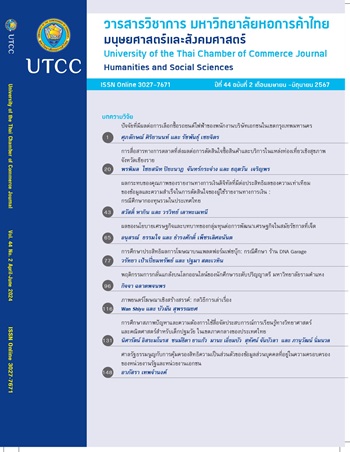Cyberbullying behavior of undergraduate students Ramkhamhaeng University
Main Article Content
Abstract
This research aims to study online bullying behavior of undergraduate students at Ramkhamhaeng University using 7 factors. It also studies relationships, develops predictive models and studies the opinions of academics and experts on ways to address cyberbullying behavior. The research has 2 parts. 1) For 400 sets of multi-stage sampling to provide descriptive statistics and reference records. 2) Interviews with academics and experts regarding solutions to online bullying problems. The research results found that Cyberbullying behavior of undergraduate students Ramkhamhaeng University is at a low level. Longer periods of time spent using the internet were associated with more cyberbullying behavior. Factors that are positively related to cyberbullying behavior are family violence, influence of violence from student friends personality and real life situations An equation for predicting cyberbullying behavior among undergraduate students. Ramkhamhaeng University is Y = 2.153 – 0.253 X1 – 0.127 X3 + 0.235 X4 + 0.217 X6 Factors that most affect cyberbullying behavior is a family factor (X1). Next is the friend factor (X4), Personal experience factors (X6) and the factor of talking, chatting, meeting up, or accepting friends with strangers (X3), respectively. Abiliyu to predict cyberbullying behavior 16.20% at a significance level of 0.05.
Correcting online bullying behavior involves all parties including family, friends, the students themselves, and teachers/professors. All must cooperate on 3 levels that is 1) providing knowledge and understanding for prevention, 2) training for immune skills, and 3) behavior change. Policy recommendations are the responsibility of Government agencies and educational institutions to integrate and work proactively to establish a counseling center to prevent and solve problems together.
Article Details

This work is licensed under a Creative Commons Attribution-NonCommercial-NoDerivatives 4.0 International License.
ลิขสิทธิ์ของบทความ
ผลงานที่ได้รับการตีพิมพ์ถือเป็นลิขสิทธิ์ของมหาวิทยาลัยหอการค้าไทย ห้ามมิให้นำเนื้อหา ทัศนะ หรือข้อคิดเห็นใด ๆ ของผลงานไปทำซ้ำ ดัดแปลง หรือเผยแพร่ ไม่ว่าทั้งหมดหรือบางส่วนโดยไม่ได้รับอนุญาตเป็นลายลักษณ์อักษรจากมหาวิทยาลัยหอการค้าไทยก่อน
References
Archaphet, N. (2017). Cyberbullying: Aggressive misbehavior and innovation for solution. The Journal of Social Communication Innovation, 5(1(9)), 100-106. [in Thai]
Charoenwanit, S. (2017). Cyberbullying: Impacts and preventions in adolescents. Thai Science and Technology Journal, 25(4), 639-648. https://li01.tci-thaijo.org/index.php/tstj/ article/view/75170/60584 [in Thai]
"Cyberbully" is raging evil in the online world. (2021, April 24). Thairath. https://www.thairath.co.th/lifestyle/woman/health/2075810 [in Thai]
Inthanon, S., & Sermsinsiri, P. (2018). The study of how youth can protect themselves from Cyberbullying. In The 2nd UTCC Academic Day (pp.1396-1046). University of the Thai Chamber of Commerce. [in Thai]
Janyametee, K., & Sripa, K. (2020). The Prevention of deviant behavior from cyberbullying victimization among youths. Warasarn Phuettikammasat, 26(2), 16-41. [in Thai]
Kaewwiset, P., Matayaboon, N., Somboon, L., & Kodyee, S. (2021). Cyber bullying behavioral and related factors of high school students in Mueng district Chiangrai province. Journal of Social Science and Buddhistic Anthropology, 6(5), 239-253. https://edu.psakserv.com/nmis/pubFile/Pub_294.pdf [in Thai]
Ketsuphan, S. (2019). Cyberbullying: Measurement, clustering and gender’s difference of undergraduate students [Unpublished master’s thesis]. Burapha University. [in Thai]
Lertratthamrongkul, W. (2021). Cyberbullying among secondary school students: Prevalence, problem-solving and risk behaviors. NEU Academic and Research Journals, 11(1), 275-289. https://so04.tci-thaijo.org/index.php/neuarj/article/view/249043 [in Thai]
Osuwan, H. (2019). Factors affecting cyberbullying behaviors of lower secondary school students in Thailand [Unpublished master’s thesis]. Chulalongkorn University. [in Thai]
Papattha, C., & Phuphet, N. (2019). Synthesis of causes, consequences, preventions and problem solving of cyber bullying among Thai adolescents. 11th Rajamangala University of Technology National Conference (pp. 525-541). Rajamangala University of Technology. [in Thai]
Phungbangkruay, J. (2020). Cyber bullying risk perception and problem solving of Royal Thai Army personnel. CRMA Journal of Humanities and Social Science, 7(1), 21-36. [in Thai]
Sittichai, R., & Tudkuea, T. (2017). Cyberbullying behavior among youth in the three Southern border provinces, Thailand. Academic Services Journal, Prince of Songkla University, 28(1), 86-99. http://dx.doi.org/10.14456/asj-psu.2017.8 [in Thai]
Surat, P. (2018). Cyber bullying in socio-culture dimensions: Case study of generation Z among Thai youths [Unpublished doctoral dissertation]. Srinakharinwirot University. [in Thai]


